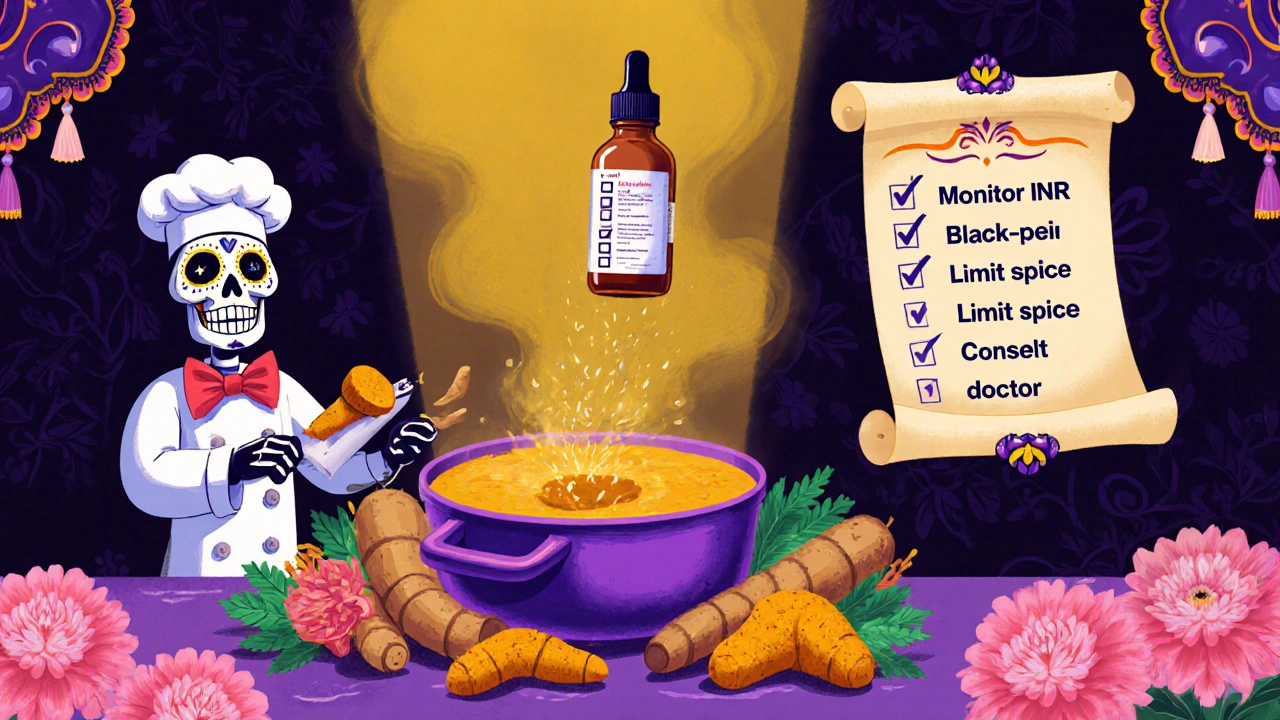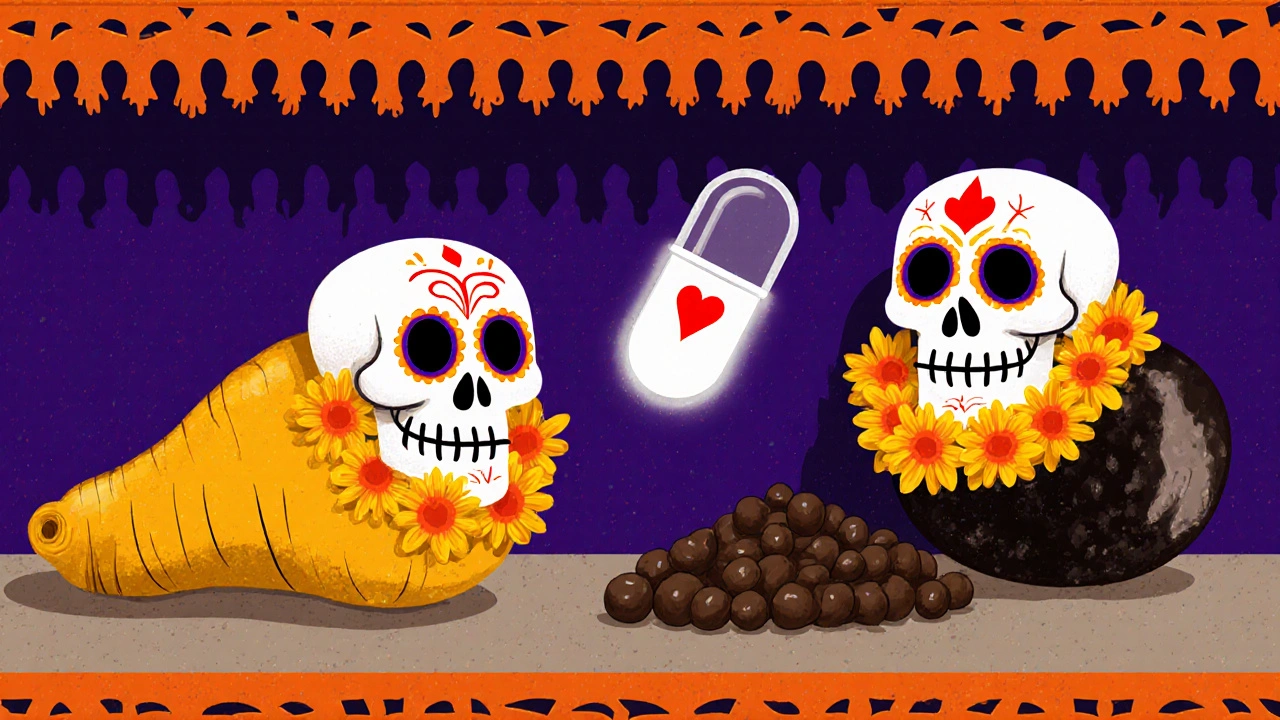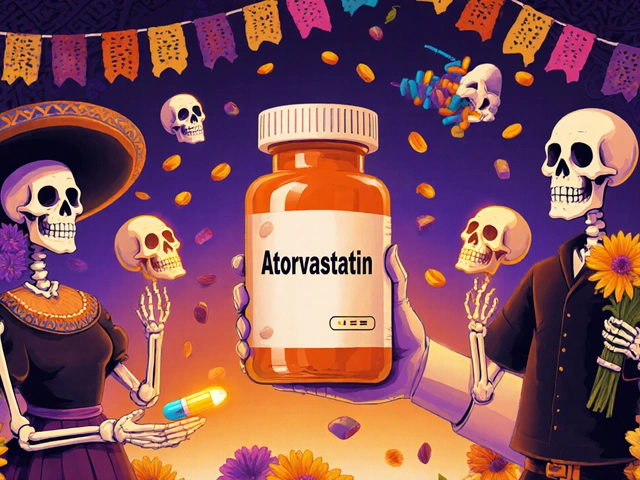Blood Thinner & Turmeric Safety Calculator
Assess Your Risk
Enter your blood thinner type and turmeric consumption details to get a personalized risk assessment.
When you hear about Turmeric is a bright yellow spice derived from the rhizome of Curcuma longa, you might think it’s just a kitchen staple. In the last decade, however, it has become a massive dietary supplement, often paired with Black Pepper is a common seasoning that contains the alkaloid piperine to boost absorption. The combo promises super‑charged curcumin levels, but for anyone on blood thinners it can be a ticking time bomb.
Why the Turmeric‑Black Pepper Duo Packs a Punch
Curcumin, the active ingredient in turmeric, is naturally poorly absorbed. Piperine in black pepper can increase curcumin’s bioavailability by up to 2,000 % according to a 2023 MDVIP analysis. That means a modest capsule can deliver a dose that would otherwise require dozens of grams of raw spice. While that sounds impressive for joint pain or inflammation, it also floods the liver’s metabolic pathways.
How the Interaction Affects Blood Thinners
Blood thinners-whether vitamin‑K antagonists like Warfarin, direct oral anticoagulants (DOACs) such as apixaban, or antiplatelet drugs like clopidogrel-rely on tightly balanced clotting mechanisms. Turmeric interferes in two ways:
- It inhibits thromboxane synthesis, reducing platelet aggregation.
- It can slow the clearance of drugs like warfarin, pushing the International Normalized Ratio (INR) into dangerous territory.
When piperine blocks CYP3A4 and P‑gp transporters, the liver’s ability to process both curcumin and the anticoagulant shrinks further, creating a perfect storm of elevated drug levels and impaired clotting.
Real‑World Evidence of Harm
A Welsh Medicines Advice Service case study from October 2024 described a patient whose INR leapt from a stable 2.4 to 4.8 after adding a turmeric supplement with black pepper. The spike prompted a hospital visit for unexpected bruising and a minor gastrointestinal bleed. In a small human trial, sulfasalazine concentrations rose 3.2‑fold when participants took 2 g of curcumin daily. Animal work showed a ten‑fold rise in clopidogrel blood levels after high‑dose curcumin.
Online health forums are flooded with similar stories: users report excessive bruising, nosebleeds, or even hospitalised GI bleeds after a few weeks of a “one‑teaspoon‑a‑day” turmeric capsule while on apixaban or warfarin. By contrast, Reddit threads show that people who limit turmeric to culinary amounts (1-2 teaspoons in food) rarely experience problems, underscoring the difference between spice and supplement.

Guidelines from Medical Authorities
Major health organisations echo the same warning:
- MedicineNet (2023) lists dangerous interactions with heparin, warfarin, aspirin, clopidogrel, diclofenac, ibuprofen, naproxen, dalteparin, and enoxaparin.
- The British Heart Foundation (2023) advises anyone on prescription anticoagulants to check with a GP before adding turmeric supplements.
- Dr. Bishop at the Cleveland Clinic (2023) recommends complete avoidance of turmeric extracts for patients on warfarin or DOACs.
- The American College of Cardiology (2024) now explicitly states “avoid turmeric‑black pepper supplements in patients taking vitamin‑K antagonists and use caution with DOACs.”
These guidelines converge on one point: culinary turmeric is generally safe, but high‑dose supplements-especially those boosted with black pepper-are not.
Monitoring Strategies for Patients Who Can’t Quit
If a patient insists on taking a turmeric supplement, clinicians should intensify monitoring:
- Check INR weekly for warfarin users instead of the usual 4‑6 week interval.
- Track liver function tests (ALT, AST, bilirubin) every 2-4 weeks; piperine‑induced liver injury can appear within 2-12 weeks.
- Ask about supplement use at every visit-studies show 42 % of patients don’t disclose it spontaneously.
- Consider switching to a non‑piperine curcumin formulation (e.g., lecithin‑based) if the anti‑inflammatory benefit is crucial.
Documentation of the supplement brand, dose, and timing relative to the anticoagulant is essential for accurate pharmacokinetic assessment.
Market Realities and Regulatory Gaps
Turmeric supplement sales topped $1.14 billion in the U.S. in 2022, with 63 % of products containing black pepper to claim “enhanced absorption.” Yet the FDA’s 2022 database shows only 41 % of those products list a warning about blood‑thinner interactions-well below the legal requirement under DSHEA for safety statements.
Adding to the concern, ConsumerLab (2022) found that 30 % of tested turmeric capsules exceeded California’s Proposition 65 lead limits, introducing a toxic heavy‑metal risk even before any drug interaction.

Practical Take‑Home Tips
Here’s a quick checklist for anyone on anticoagulation therapy:
- Avoid turmeric capsules or powders that list piperine or black pepper extract.
- If you love the flavor, stick to fresh turmeric root in meals-no more than 1-2 teaspoons per day.
- Ask your pharmacist or doctor to review all over‑the‑counter supplements before starting.
- Keep a written list of all medicines and supplements; bring it to every appointment.
- Watch for signs of bleeding (unusual bruising, blood in urine or stool, prolonged nosebleeds) and seek medical help promptly.
Following these steps can keep the benefits of turmeric’s anti‑inflammatory properties without jeopardising the safety of your blood‑thinner regimen.
Comparing Supplement Forms
| Form | Typical Curcumin Dose | Piperine Included? | Impact on Anticoagulants | Recommended Use for Patients on Blood Thinners |
|---|---|---|---|---|
| Standard capsule (no black pepper) | 500 mg | No | Modest increase in INR; occasional bruising reported | Generally avoid; if needed, use lowest dose and monitor INR |
| Capsule with black pepper (piperine 5 %) | 500 mg | Yes | 20‑fold rise in curcumin levels; significant INR spikes observed | Not recommended; seek non‑piperine alternatives |
| Liquid extract (black pepper‑free) | 300 mg | No | Lower risk but still possible interaction at high doses | Use only under physician supervision |
| Culinary fresh turmeric root | ~30 mg per teaspoon (in food) | No | Negligible effect on clotting | Safe; limit to typical cooking amounts |
Future Outlook
Research is already exploring piperine‑free delivery systems-lecithin‑based nanoparticles, for example-that aim to keep curcumin’s benefits while sidestepping the absorption surge. If such formulations gain FDA approval, we may see a new class of “safe‑for‑anticoagulants” turmeric supplements by 2026.
Until then, the safest route remains simple: keep turmeric in the kitchen, keep black‑pepper‑enhanced supplements off the medicine cabinet, and stay in close contact with your healthcare team.
Can I take any turmeric supplement while on warfarin?
No. Even turmeric capsules without black pepper can raise INR, but the risk grows dramatically with piperine. Only a physician‑approved, low‑dose, black‑pepper‑free product should be considered, and INR must be monitored closely.
Is fresh turmeric safe for someone on apixaban?
Yes, when used in normal cooking amounts (1-2 teaspoons per day) fresh turmeric does not meaningfully affect apixaban levels. The key is to avoid concentrated extracts.
What symptoms should I watch for if I accidentally take a turmeric‑black pepper supplement?
Look for unusual bruising, nosebleeds, blood in stool or urine, prolonged bleeding from cuts, and signs of liver trouble such as yellowish skin or dark urine. Seek medical care right away.
How often should my INR be checked if I start a turmeric supplement?
Switch to weekly INR testing for at least the first two weeks, then adjust based on stability. Most clinicians will recommend stopping the supplement altogether.
Are there any safe alternatives to turmeric for joint pain?
Consider glucosamine, boswellia, or low‑dose omega‑3 fish oil, all of which have evidence for joint health and don’t interfere with blood thinners.








9 Comments
Joy Dua October 26, 2025
The biochemical interplay of curcumin and piperine is a double‑edged sword that can slice both inflammation and coagulation pathways, a paradox that demands disciplined vigilance. In patients on anticoagulants the amplified absorption may tip the delicate hemostatic balance toward bleeding risk. Navigating this terrain requires clinicians to treat the supplement as a potent pharmacologic agent.
Holly Kress October 28, 2025
I appreciate the clear framing of the risk; a measured approach is essential when adding any bio‑enhancer to a warfarin regimen. Patients should be encouraged to discuss any over‑the‑counter product with their prescriber before use.
Chris L October 31, 2025
Exactly, open communication builds the safety net we need. Even a modest turmeric dose can shift INR, so regular monitoring and a candid medication list are wise steps.
Charlene Gabriel November 2, 2025
When you consider the sheer popularity of turmeric supplements, it is impossible not to marvel at how a culinary spice has morphed into a billion‑dollar industry.
The promise of accelerated recovery from joint pain or reduced inflammation is alluring, especially for older adults who already manage chronic conditions.
However, the addition of piperine, the black‑pepper alkaloid, transforms a humble herb into a pharmacokinetic accelerator that can overwhelm the liver's processing capacity.
For patients on vitamin‑K antagonists such as warfarin, this acceleration can manifest as a sudden spike in INR, pushing the clotting cascade toward a precarious hypocoagulable state.
Clinical anecdotes, like the Welsh case where INR doubled after a short course of turmeric‑pepper capsules, underscore how quickly the balance can tip.
Even more subtle is the interaction with direct oral anticoagulants, where elevated plasma concentrations may not be captured by routine INR testing yet still heighten bleed risk.
Therefore, physicians should not merely advise avoidance of the supplement but also proactively ask patients about any over‑the‑counter products they might be taking.
A systematic review of patient surveys revealed that nearly half of individuals on blood thinners failed to disclose their supplement use unless directly questioned.
Education initiatives that normalize discussion of herbal products can close that disclosure gap and empower patients to make safer choices.
From a practical standpoint, recommending culinary use of fresh turmeric-limited to one or two teaspoons per day in meals-offers anti‑inflammatory benefits without the dangerous surge in curcumin levels.
If a patient insists on a supplement, opting for a black‑pepper‑free formulation and commencing at the lowest possible dose can mitigate risk while still providing some therapeutic effect.
In such cases, weekly INR checks for the first two weeks, followed by a return to the standard interval if stability is observed, represent a prudent monitoring strategy.
Liver function tests should also be ordered periodically, as piperine has been implicated in hepatic enzyme modulation that could affect drug metabolism beyond anticoagulants.
Meanwhile, ongoing research into novel delivery systems-such as lecithin‑based nanoparticles-promises to retain curcumin's benefits without the need for piperine, potentially opening a safe pathway for future patients.
Until those technologies receive regulatory approval, the safest recommendation remains a simple one: keep turmeric in the kitchen, keep black‑pepper‑enhanced capsules out of the medicine cabinet, and stay in close contact with your healthcare team.
By adhering to these guidelines, patients can enjoy the flavor and modest health advantages of turmeric without jeopardizing the delicate anticoagulant balance that protects them.
Leah Ackerson November 5, 2025
One might say the body is a delicate orchestra and turmeric‑pepper supplements are the rogue violinist that tries to solo without a conductor - a dangerous improvisation 🎻😬. The evidence spares no doubt: when you tamper with metabolic pathways you invite chaos, especially for those whose clotting mechanisms are already throttled by medication.
renee granados November 7, 2025
They don’t tell you the truth about these pills; big pharma wants us to think it’s safe while they push hidden enzymes that mess with blood thinners. Stay alert and read every label.
Stephen Lenzovich November 9, 2025
Patriotic citizens must demand transparency from supplement manufacturers; it is un-American to obscure potential hemorrhagic hazards behind glossy packaging. Until regulatory rigor matches our national standards, caution remains the only patriotic act.
abidemi adekitan November 12, 2025
Indeed, weaving colorful narratives about natural remedies can inspire hope, yet we must anchor those stories in solid research before we let them drift into our medicine cabinets. A balanced dialogue between tradition and science serves everyone.
Barbara Ventura November 14, 2025
Interesting point, indeed; thanks for sharing!